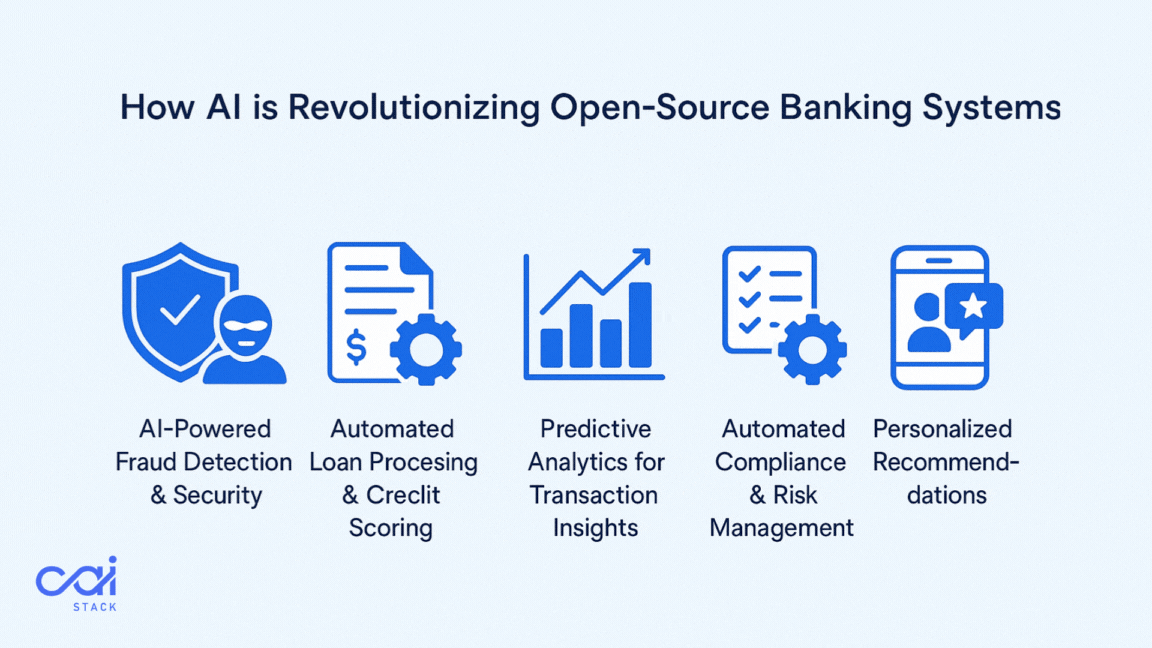This is the new era of smart banking systems; result, banks are caught between a rock and a hard place. They need to modernize their systems to meet customers' expectations while maintaining high-end security and compliance.

Legacy systems that once served as the backbone of financial operations have now become barriers to innovation and customer satisfaction.
AI in banking solutions, particularly with open-source platforms, offers compelling paths forward for financial sectors seeking competitive advantages in a rapidly evolving marketplace.
McKinsey recently conducted a study of generative AI use by 16 of the largest financial institutions within Europe and the USA, collectively adding nearly $26 trillion in assets.
Let's dive into this guide to explore the possibilities and complexities of AI in open-source banking systems.
AI in open-source banking systems refers to the integration of artificial intelligence technologies within banking software that is developed and distributed with open-source licenses.
AI in open-source banking allows them to modify, customize, and improve the software according to the needs. AI capabilities are integrated into these platforms to automate, optimize, and secure various banking processes.
Financial fraud represents a major expense for banks around the world.
Global banks like Citibank implemented an AI-driven fraud detection system that reduced fraud-related losses by 25% within the first year
The Nigerian banking sector has successfully utilized the power of Artificial intelligence in their finances; they have seen a decrease in fraud losses by 77.66% in the first quarter of 2024
Traditional loan approval processes involve significant manual review, creating bottlenecks and inconsistent customer experiences.
Organizations that have deployed artificial intelligence in finance for loan processing report substantial efficiency improvements while maintaining or improving loan quality metrics.
Transaction data represents one of banking's most valuable yet underutilized assets. AI-powered analytics convert this data into actionable business intelligence.
These capabilities, once available only to the largest global institutions, have now become accessible to regional and community banks through open-source banking platforms.
Regulatory requirements continue to expand in scope and complexity. Manual compliance processes struggle to provide comprehensive coverage while remaining cost-effective.
Financial institutions report meaningful compliance cost reductions while improving coverage and reducing regulatory findings through intelligent automation.
Customer expectations have fundamentally shifted due to experiences with digital leaders across industries. Financial organizations must use Dynamic Customer Segmentation to deliver similarly personalized experiences to remain competitive.
Organizations implementing these capabilities report improvements in product adoption rates and significant increases in customer satisfaction metrics.
Most banking infrastructure was developed decades ago with fundamentally different requirements than today's digital-first environment. These legacy systems present multiple real challenges:
This technology gap creates substantial opportunities for open-source banking systems enhanced with artificial intelligence capabilities.
According to the McKinsey report, AI technologies could potentially bring up to $1 trillion in additional value to banking and financial institutions each year.
While proprietary AI solutions dominate many discussions about banking systems modernization, open-source core banking solutions offer compelling advantages:
Financial organizations implementing open-source banking systems with AI capabilities report both cost advantages and performance improvements compared to proprietary alternatives.
Open banking offers ample opportunities by providing banks with control over their banking data. It allows banks to personalize their financial solutions and innovation across the industry. By 2030, open-source architectures will be the fundamental infrastructure powering banking operations worldwide.
Perhaps its implementation also comes with certain risks, like data privacy concerns, regulatory gaps, and liability issues. Without the right frameworks, these risks can outweigh the benefits.
Banks must take a cautious, well-informed approach to adopting open banking systems. A secure and well-regulated environment is key to unlocking its full potential while protecting consumer interests.
As open-source banking creates new opportunities, artificial intelligence in finance represents a fundamental shift rather than an incremental improvement. We provide the comprehensive foundation your institution needs to implement these AI capabilities. Our financial services integrate seamlessly with your existing systems while ensuring the security, scalability, and compliance that your financial institutions require.
Contact us today to schedule a free demo and discover how the CAI Stack can accelerate your AI transformation journey securely, responsibly, and ahead of the curve.
Subscribe to get the latest updates and trends in AI, automation, and intelligent solutions — directly in your inbox.
Explore our latest blogs for insightful and latest AI trends, industry insights and expert opinions.
Empower your AI journey with our expert consultants, tailored strategies, and innovative solutions.